|
|
|
Sort Order |
|
|
|
Items / Page
|
|
|
|
|
|
|
| Srl | Item |
| 1 |
ID:
116182
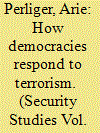

|
|
|
|
|
| Publication |
2012.
|
| Summary/Abstract |
While the academic study of counterterrorism has gained momentum in recent years, it still suffers from major theoretical weaknesses. One of the most prominent shortcomings is an absence of theories that can effectively explain the factors that shape the counterterrorism policies of democratic regimes. The present study attempts to fill this theoretical void in two ways. First, it proposes an analytical framework for a classification of counterterrorism policies. Second, it presents a theoretical framework that strives to uncover the factors that have influenced the struggle against domestic terrorism in democratic regimes. The analyses, which have used a unique and comprehensive dataset that documents counterterrorism policies in eighty-three democracies, show that the robustness of the regime's democratic foundations as well as the symbolic effect of terrorism are major forces in shaping the democratic response to it, while the direct impact of terrorism is less influential than assumed in the literature.
|
|
|
|
|
|
|
|
|
|
|
|
|
|
|
|
| 2 |
ID:
178075


|
|
|
|
|
| Summary/Abstract |
This article addresses the question of how the history of political violence targeting individuals on the basis of their race, religion, or ethnicity is memorialized in democracies. To what extent do states’ memorialization practices reflect their democratic values and institutions? The study addresses these questions by bridging the theoretical literatures of memory studies and political regimes. It compares two cases that differ in the circumstances under which they transitioned to democracy, but that have in common the history of political violence of exclusion. The first case includes the Holocaust memorials and monuments in Germany following the reunification, and the second case, the memorialization of the inter-ethnic violence in the 1990s in Bosnia and Herzegovina. By focusing on the memorials, rather than on the characteristics of a political regime, the article argues that memorials that are inclusive of different perspectives and experiences and those that encourage critical reflection and community involvement are more aligned with democratic values. The congruence between the characteristics of the political regime and those of the memorial should not be assumed even in the cases of consolidated democracies.
|
|
|
|
|
|
|
|
|
|
|
|
|
|
|
|
| 3 |
ID:
142076
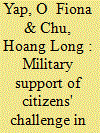

|
|
|
|
|
| Summary/Abstract |
When do militaries in the newly industrialized countries of East and Southeast Asia support their governments, when do they support citizens' challenge of government, and when do they launch coups? We propose and test a theory of military behavior using data from across East and Southeast Asia between the 1970s and 2008. The results corroborate the model's predictions to make four contributions: First, the model provides a framework of military behavior for countries to expand study beyond coups or the absence thereof. Second, the findings bring to focus the influence of citizens on the military's behavior, an aspect largely overlooked in scholarship of the region. Third, the necessary conditions—weak economy and galvanized citizens' challenge— that affect the military's behavior vis-à-vis citizens and the government highlight the strategic interaction treatment. Fourth, this study broadens systematic treatment to enrich empirics and theory-building for the political economies of these countries.
|
|
|
|
|
|
|
|
|
|
|
|
|
|
|
|
| 4 |
ID:
171293
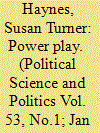

|
|
|
|
|
| Summary/Abstract |
One of the most alarming trends of the past decade has been the rise in authoritarianism and the growing support of strongman politics among citizens of democratic regimes. College instructors have a unique opportunity to challenge such thinking at a time when many of their students are still forming their political beliefs. Using a game, instructors not only can show students the perils of authoritarianism, they also can potentially expand students’ appreciation of democracy. This article describes a game suitable for this purpose. Students take on the role of workers, soldiers, and rulers in a military dictatorship to learn about the “guns-and-butter tradeoff” and authoritarian uncertainty.
|
|
|
|
|
|
|
|
|
|
|
|
|
|
|
|
| 5 |
ID:
143325
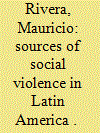

|
|
|
|
|
| Summary/Abstract |
The study of social violence in Latin America has stood at the periphery of cross-national research despite the region being one of the most violent in the contemporary world. This article provides a comprehensive review of theories of crime and presents an empirical analysis of social violence in Latin America from 1980 to 2010. The literature often emphasizes one theoretical approach over others and existing explanations are seen as competitive rather than complementary. Yet, the empirical findings of this study support different explanations and illustrate how considering different theoretical approaches helps improve our knowledge on social violence phenomena. The results from different estimation methods reveal that youth bulges, female workforce, and post-conflict states are positively associated with social violence, as measured by homicide rates. The results also show that states’ efforts to strengthen judicial system capacity and increase school attendance can promote peace. Moreover, while drug producers and/or transit countries are not systematically related to social violence, money-laundering countries experience higher homicide rates, suggesting that not all dimensions of drug-markets increase violence. Whereas Latin America as a whole has experienced few episodes of civil wars in the past decades, the findings suggest that several factors affecting the onset of civil wars also influence other forms of non-political violence such as social violence. This echoes earlier calls in the literature on the necessity of bridging conflict and criminology research.
|
|
|
|
|
|
|
|
|
|
|
|
|
|
|
|
| 6 |
ID:
148135
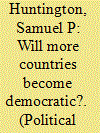

|
|
|
|
|
| Summary/Abstract |
SAMUEL P. HUNTINGTON analyzes the preconditions for, and the processes of, democratization to evaluate the prospects for the emergence of additional democratic regimes in the world. He does not find those prospects very bright.
|
|
|
|
|
|
|
|
|
|
|
|
|
|
|
|
|
|
|
|
|